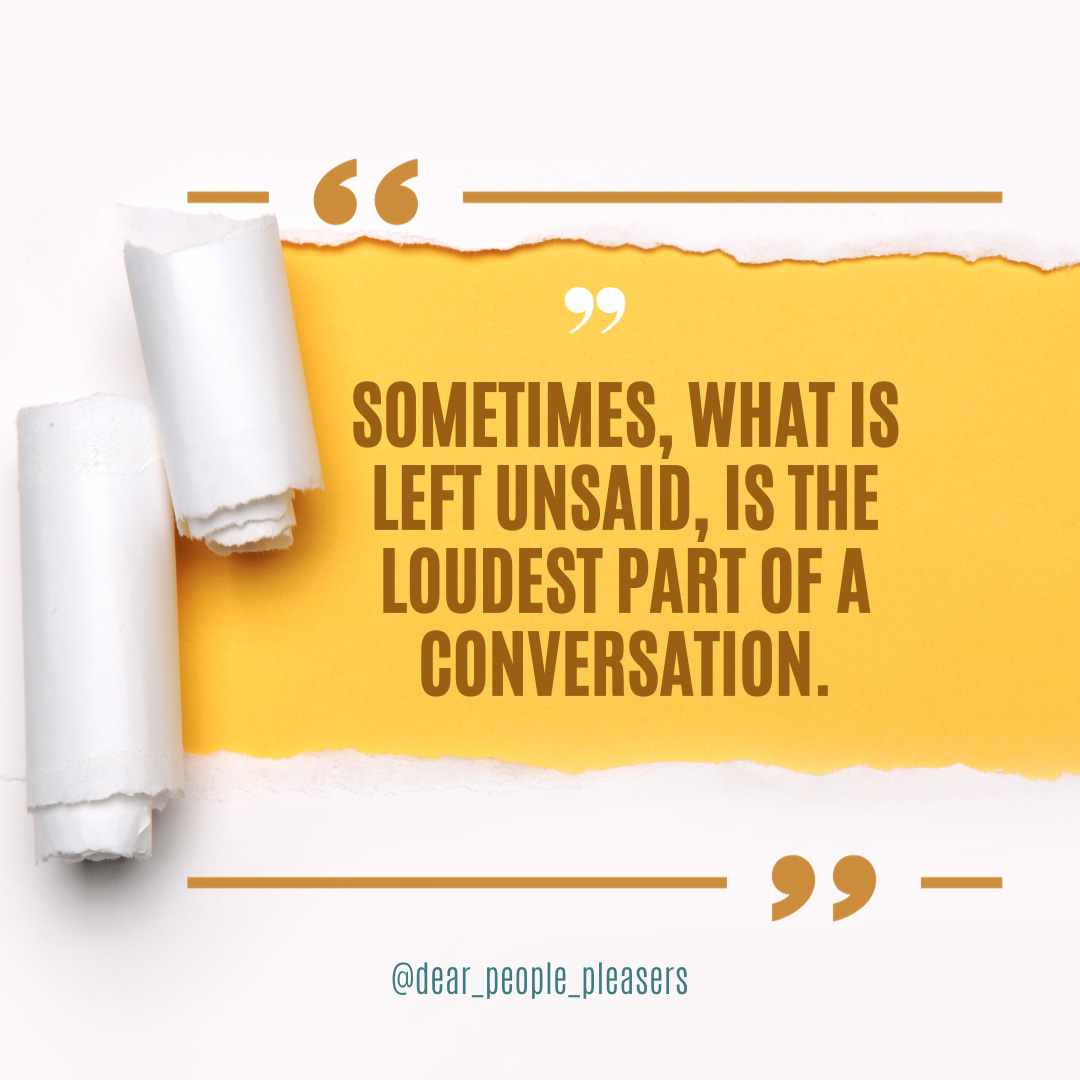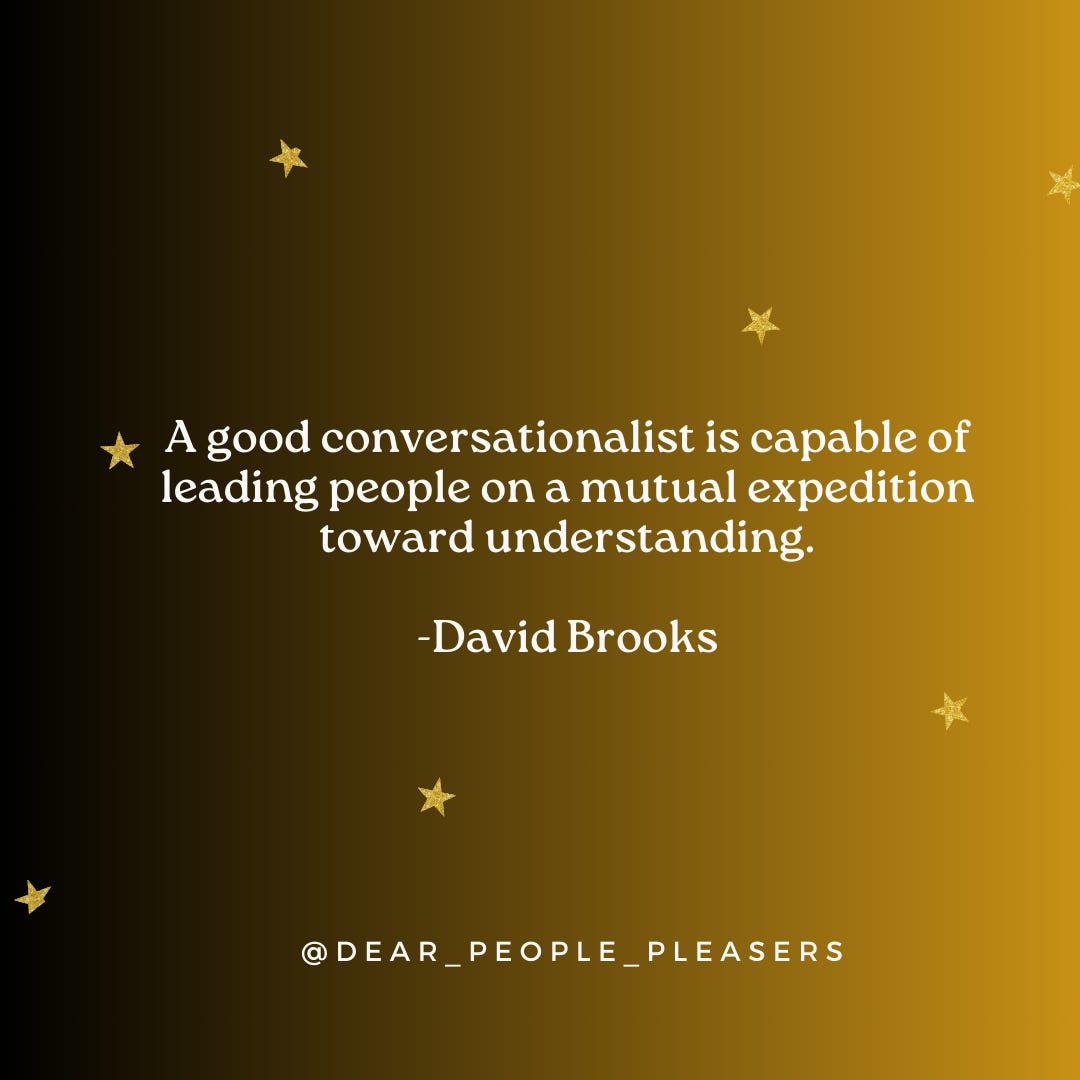“To acquire knowledge, one must study; but to acquire wisdom, one must observe.”
Marilyn Vos Savant
Dear people pleasers,
Welcome to 2024!
May this new year bring us a fresh perspective on ourselves, our circles, and our lives. No audio recording this week as I am sick and thought I would spare you a stuffy reading of this newsletter.
Today I want to go over the third pillar of Emotional Intelligence: Social Awareness. To achieve success in the aspect of social awareness, we must first have some practice with self-awareness (foundation of EQ or EI), and self-management (second pillar of EQ). If we have successfully taken the time to understand ourselves and how to manage our feelings, (please feel free to review my archive newsletters if you need any tips on where to start) then we can take the next step in our journey to emotional intelligence by approaching Social Awareness.
In today’s letter I will cover:
What Social Awareness means
3 tips to becoming Socially Aware
And as always, resource links for you to practice in your daily life
What is Social Awareness?
As described by Travis Bradbury & Jean Greaves, authors of Emotional Intelligence 2.0, Social Awareness can be understood as:
“Instead of looking inward to learn about and understand yourself, social awareness is looking outward, to learn about and appreciate others.”
Since we know the basics of looking inward to understand ourselves (self-awareness), and have tools to leverage labeling and moving through our feelings (self-management), we are now ready to explore our outer world. Humanity is vast, and people are all so different. That being said, we tend to flock towards those who are exactly like us. A study with The University of Kansas shows that the majority of us end up in relationships with those who are most like ourselves. Researchers at Wellesley College and KU found that our desire for “like-minded others” is hard-wired in us.
Think about the last time you made a new friend, (for some of us this activity will require dusting the cobwebs from our minds). What drew you to this stranger? It is likely that you found something in common with this individual. We are drawn to people who share our interests because it psychologically makes us feel safe. Safety lies within the foundations of Maslow's Hierarchy of Needs of needs.
After first establishing safety in your relationships, it is also important to diversify your social circles in order to enrich your life. This advice seems counter-intuitive, and is truly only a step we can take once we become experts at navigating pillars one and two of EQ. If you are not yet self-aware, or able to manage your emotions- diversifying your social circles will leave you frustrated and feeling isolated in your perspective of the world.
Once you are comfortable and confident in yourself and your feelings- diversifying your social circles becomes fascinating and deeply fulfilling. “When you surround yourself with people quite different from you, it is likely that you will all bring different ideas to the table and challenge each other with those ideas, helping each other grow interpersonally and even outside these relationships” says TJ Barber, Counselor at Centerstone.
To personalize this practice, I would like to shine a light on my sons’ Uncle Hammed- our closest family friend, who has enriched my life exponentially since entering it. (Mo)Hammed, has challenged my understanding of religion in several dinner discussions over Islam, the religion my husband Omar, reverted to after our son was born three years ago. While I do not prescribe to any particular religion, I do align myself with spirituality, and believe in something greater than humankind. Hammed asks me to share my beliefs and gently explains his opposite experiences. He lives his life through the English translation of the word Islam, which means peace. These interactions help me to foster grace and understanding for my own marriage, and find comfort in the fact that my partner and I have differing core values.
Diversifying our social circles is not limited to expanding our conversations around religion but also includes diversity of:
Sex & Gender
Education
Sexual Orientation
Race & Ethnicity
Language (this can be tricky if neither party is able to speak the others language- but common ground can be found if we try)
Mental & Bodily (dis)Ability
Behavior/Persona
Culture
and also… diversity of thought.
When we challenge what we know to be true, and connect with others who live different experiences from ourselves, we engage in what is known as a Growth Mindset. Cultivating this kind of curiosity has been linked to living longer, and healthier lives!
How do we practice Social Awareness?
There are several approaches to strengthening our social awareness. Let’s start with three strategies:
Stop looking and start seeing
This one is harder than it seems because it requires awareness. Instead of passively looking at the person in front of you, truly seeing them, requires more mental and emotional gymnastics. Instead of noticing what color their shoes are, look beyond that:
Notice their body language (what are they saying without words?)
Hold eye contact- are they conveying emotion in their face that matches the tone of their words?
Engage the Art of Active Listening
Active listening means paying attention to both the words being said, and what has been left unsaid, in your discussions. Sometimes what is left unsaid is the loudest part of a conversation.
Don’t ask questions if you don’t plan to listen to the answers.
It may seen kind to inquire, but if you’ve ever had it happen to you, then you know the burn it leaves on your heart when someone asks, and then clearly stops listening as you share something important. If you ask a question, show that you care by being fully present for an answer. How can we practice this?
Stop multitasking
Listen to the tone, speed and volume of voice
Ask questions that you truly care to learn answers to, it feels disingenuous when you ask and then stop caring
Walk a Mile in Their Shoes
Yep- this age-old advice is sound. And yes- you must be able to lean on self-compassion before you successfully empathize with or begin to understand others. Many of us, including myself, have believed that if we prioritize the experience of others, over our own (denying our inner feelings any attention) we will help others heal. While yes- we receive external validation and become well liked (ring a bell, people-pleasers?) this is not authentic compassion. Compassion stems from recognizing pain in someone else, because we have been there, and felt it ourselves. Beyond empathy, compassion asks our hearts to help those we see in pain. To practice this:
Repeat back what you heard: “What I am hearing you say is that…” This can help with misunderstanding early on if confusion is clarified
Drop your judgement and get curious. Of course, if someone lives life in a way that is totally opposite of yours, it is natural for us to judge. In order to really walk a mile in someone else’s shoes, we have to step out of our own. Picture yourself in their actual physical shoes. Their clothes, their home or their life. What does that feel like? Keep wondering, and asking questions.
This is a lot to work on and consider. There are also a few “spikey ideas” I’ve shared that you may disagree with- thank you for reading, and being here with me. Sometimes learning feels uncomfortable- and I commend you if you are self-aware enough to recognize this. My aim is to create FREE resources around emotional intelligence that are accessible to anyone, anywhere, with an email address. I talk about why in Emotions: Name It to Tame It and my Welcome Email, which I pray you received upon subscribing.
If anyone you know came to mind while reading today’s newsletter- I would love for you to share it with them:
As promised- this weeks links:
Books:


Good luck connecting with both yourself and others this week, please share your experiences of people watching and walking a mile in their shoes in the comments!
Digital hugs,
K.Alexandra






A long time ago I was in public with a friend and we saw a stranger completely flip out on some other stranger. My friend said something along the lines of 'you don't know how his day has gone... maybe his dog died this morning'. It always stuck with me - and I wasn't even a dog owner at the time (I could cry any second of the day thinking of the fact my dog will some day die haha). People have entire lives going on that you know nothing about, so I always try to give everyone some slack.